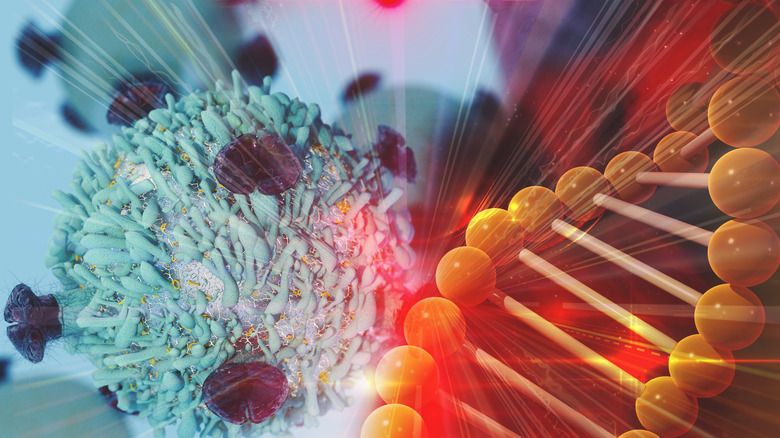Scientists Use A Virus To Kill Human Cancer Cells In A Revolutionary New Therapy
Scientists have injected their first human patient with an experimental virus that is designed to kill cancer as part of a phase 1 clinical trial conducted by biotech company Imugene Limited and cancer research institute City of Hope National Medical Center. According to Gizmodo, the novel treatment is intended to prime the body's immune system against cancer cells in patients with solid tumors. The virus, known as CF33-hNIS, or Vaxinia, is a genetically modified smallpox virus that was engineered to selectively infect and kill cancer cells in advanced solid tumors by injecting the virus directly into the tumor or in a nearby vein.
It is also meant to help the immune system more easily identify cancerous cells in the body. Vaxinia will be tested on a total of 100 participants who have previously undergone at least two different types of cancer treatments, per Gizmodo. Believe it or not, Vaxinia has previously been shown to be effective in animals. At this stage of the clinical trial, however, only the safety and dosage of the treatment will be assessed, not the efficacy. Whether or not the treatment works will be assessed later on in the trial.
How does the virus work?
Since Vaxinia is an oncolytic virus, it works by infecting and replicating inside cancerous tumor cells, according to Medical News Today. Once an oncolytic virus replicates, its particles can disintegrate and effectively kill the cells it has infected. This causes the cells to burst and release particles that act as antigens, which the immune system recognizes as foreign substances. This response then stimulates the immune system to attack and kill more cancer cells nearby.
Initially, however, oncolytic viruses use proteins and receptors expressed by cancer cells to find and target them in the first place. "Interestingly, the same characteristics that eventually make cancer cells resistant to chemotherapy or radiation treatment actually enhance the success of oncolytic viruses, such as CF33-hNIS," Dr. Yuman Fong, the chair of the Department of Surgery at City of Hope, told Medical News Today. Before scientists can test the effectiveness of Vaxinia, however, they will need to see whether or not the experimental virus is safe and tolerable for cancer patients participating in the clinical trial.


